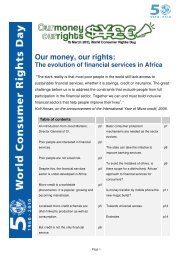Voices for Change: the Consumer Right to Representation
Voices for Change: the Consumer Right to Representation
Voices for Change: the Consumer Right to Representation
Create successful ePaper yourself
Turn your PDF publications into a flip-book with our unique Google optimized e-Paper software.
World <strong>Consumer</strong> <strong>Right</strong>s Day 2002: <strong>Voices</strong> <strong>for</strong> <strong>Change</strong><br />
6 <strong>Representation</strong> at <strong>the</strong><br />
Global Level<br />
This chapter outlines CI’s ef<strong>for</strong>ts <strong>to</strong><br />
represent <strong>the</strong> consumer interest at <strong>the</strong><br />
global level. It is opened by CI President<br />
Louise Sylvan, who outlines CI’s strategy.<br />
Subsequent sections focus on food, trade,<br />
utilities, standards, <strong>the</strong> Organisation <strong>for</strong><br />
Economic Cooperation and Development<br />
and <strong>the</strong> TransAtlantic <strong>Consumer</strong> Dialogue.<br />
One of <strong>the</strong> critical goals of <strong>Consumer</strong>s<br />
International is <strong>the</strong> creation of a strong voice<br />
<strong>for</strong> consumers in <strong>the</strong> places where important<br />
decisions are taken globally. Without<br />
representation, <strong>the</strong> consumer perspective<br />
would be virtually absent from <strong>the</strong> debates<br />
about many issues that affect consumers in<br />
quite fundamental ways. With <strong>the</strong> global<br />
market, <strong>the</strong> importance or consumer<br />
representation <strong>to</strong> balance business interests<br />
cannot be overstated.<br />
CI’s goal of creating of a strong consumer<br />
voice through global representation has two<br />
basic elements.<br />
1. Creating policy recommendations,<br />
coupled with <strong>the</strong> <strong>for</strong>ce and competence (in<br />
presentations, networking and lobbying) with<br />
which consumer representatives present <strong>the</strong><br />
policy positions on behalf of us all. This is not<br />
just a matter of a good speaker, good strategist<br />
or good networker. Critical <strong>to</strong> <strong>the</strong> <strong>for</strong>ce of<br />
our presentations is <strong>the</strong> research we have<br />
conducted on <strong>the</strong> issue – whe<strong>the</strong>r that<br />
research has been conducted directly in <strong>the</strong><br />
marketplace, done from a desk, or is <strong>the</strong> result<br />
of <strong>the</strong> compilation of <strong>the</strong> many consumer<br />
experiences known <strong>to</strong> our members.<br />
As an example of influential market research,<br />
look at CI’s 1999 study on Internet shopping,<br />
<strong>Consumer</strong>s@Shopping. This was an absolute<br />
agenda-setter that allowed us <strong>to</strong> set many of <strong>the</strong><br />
parameters of <strong>the</strong> global debate on e-commerce.<br />
For a wonderful example of desk research,<br />
Unpacking <strong>the</strong> GATT, published by CI in 1995,<br />
is probably without peer as a demystifying<br />
strategy. A prime example of aggregating<br />
consumer grassroots knowledge and experience<br />
<strong>to</strong> influence policy comes from <strong>the</strong> impact<br />
assessments by CI members on WTO<br />
agreements in agriculture and services, released<br />
last Oc<strong>to</strong>ber in Geneva. The fact that <strong>the</strong> WTO<br />
held a seminar <strong>the</strong>re on CI’s behalf, with<br />
excellent attendance by government representatives,<br />
shows how effective this can be.<br />
2. Creating an influential voice in our own<br />
nations be<strong>for</strong>e international meetings occur.<br />
The national-global nexus is critical <strong>to</strong> our<br />
success at international level. Our government<br />
representatives come <strong>to</strong> <strong>the</strong>se global meetings<br />
generally with positions decided well be<strong>for</strong>e<br />
<strong>the</strong>y board <strong>the</strong> planes. The interplay<br />
between governments and consumer<br />
representatives at a global meeting is<br />
generally as important as <strong>the</strong> work each of<br />
our organisations has done in <strong>the</strong> lead-up <strong>to</strong><br />
that meeting.<br />
What will be terrific – and we’re not far off<br />
– is when our consumer representatives’<br />
contingent is big enough <strong>for</strong> our members <strong>to</strong><br />
have <strong>the</strong> time <strong>to</strong> advise us if our governments<br />
“misbehave” in <strong>the</strong> presentation of previously<br />
agreed positions when <strong>the</strong>y’re sitting at <strong>the</strong><br />
negotiating table. It’s certainly happened – I’ve<br />
watched Australian government delegates<br />
35






![pkef]Qmf eg]sf] s] xf] < - Consumers International](https://img.yumpu.com/6479658/1/184x260/pkefqmf-egsf-s-xf-consumers-international.jpg?quality=85)
